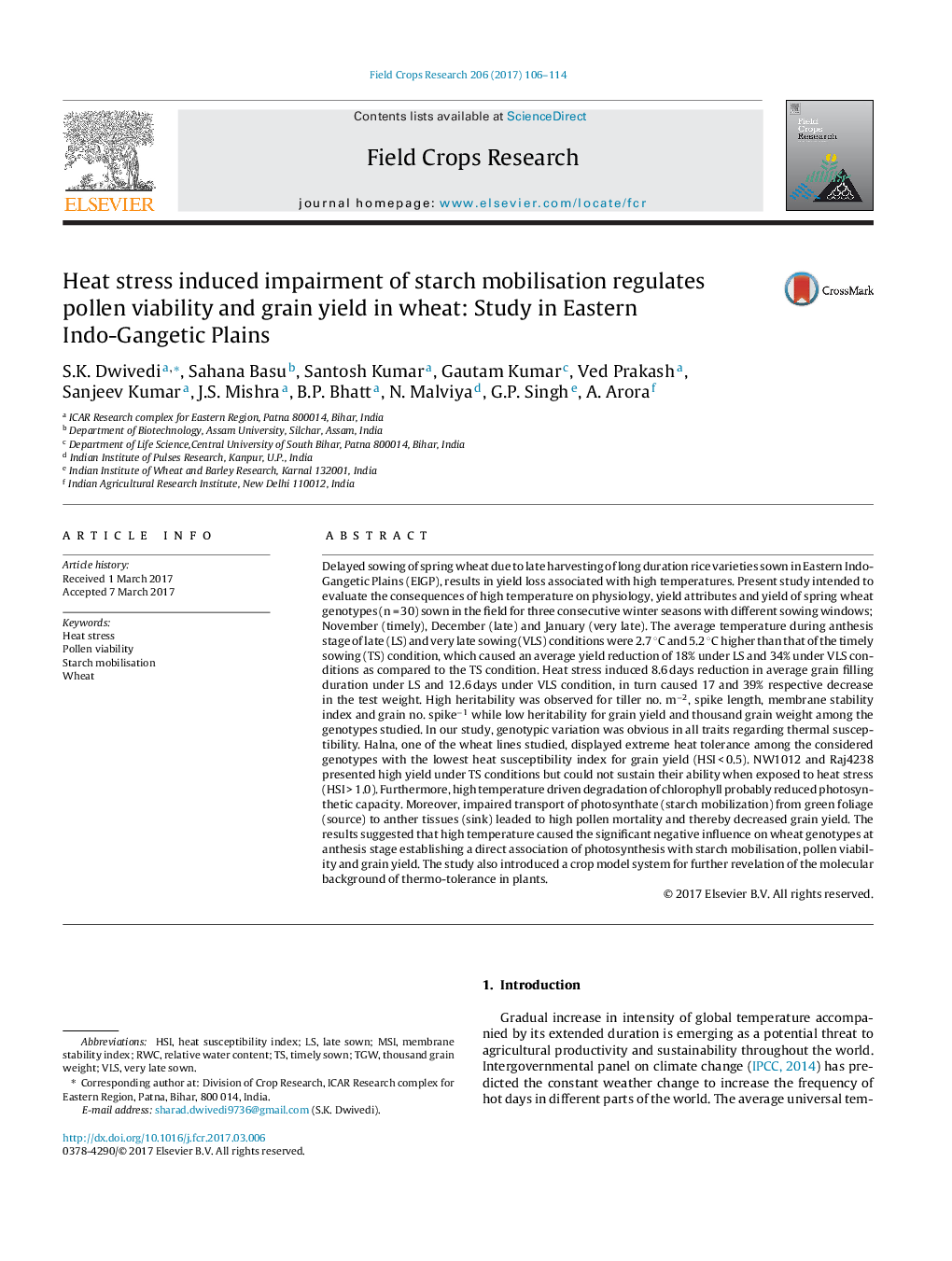| کد مقاله | کد نشریه | سال انتشار | مقاله انگلیسی | نسخه تمام متن |
|---|---|---|---|---|
| 5761530 | 1624657 | 2017 | 9 صفحه PDF | دانلود رایگان |
عنوان انگلیسی مقاله ISI
Heat stress induced impairment of starch mobilisation regulates pollen viability and grain yield in wheat: Study in Eastern Indo-Gangetic Plains
ترجمه فارسی عنوان
اختلال ناشی از تنش گرمادهی در نشاسته، موجبات حیات حیوانات گرده و عملکرد دانه در گندم را بررسی می کند: مطالعه در دشت های هند-گنگیک شرقی
دانلود مقاله + سفارش ترجمه
دانلود مقاله ISI انگلیسی
رایگان برای ایرانیان
کلمات کلیدی
موضوعات مرتبط
علوم زیستی و بیوفناوری
علوم کشاورزی و بیولوژیک
علوم زراعت و اصلاح نباتات
چکیده انگلیسی
Delayed sowing of spring wheat due to late harvesting of long duration rice varieties sown in Eastern Indo-Gangetic Plains (EIGP), results in yield loss associated with high temperatures. Present study intended to evaluate the consequences of high temperature on physiology, yield attributes and yield of spring wheat genotypes (n = 30) sown in the field for three consecutive winter seasons with different sowing windows; November (timely), December (late) and January (very late). The average temperature during anthesis stage of late (LS) and very late sowing (VLS) conditions were 2.7 °C and 5.2 °C higher than that of the timely sowing (TS) condition, which caused an average yield reduction of 18% under LS and 34% under VLS conditions as compared to the TS condition. Heat stress induced 8.6 days reduction in average grain filling duration under LS and 12.6 days under VLS condition, in turn caused 17 and 39% respective decrease in the test weight. High heritability was observed for tiller no. mâ2, spike length, membrane stability index and grain no. spikeâ1 while low heritability for grain yield and thousand grain weight among the genotypes studied. In our study, genotypic variation was obvious in all traits regarding thermal susceptibility. Halna, one of the wheat lines studied, displayed extreme heat tolerance among the considered genotypes with the lowest heat susceptibility index for grain yield (HSI < 0.5). NW1012 and Raj4238 presented high yield under TS conditions but could not sustain their ability when exposed to heat stress (HSI > 1.0). Furthermore, high temperature driven degradation of chlorophyll probably reduced photosynthetic capacity. Moreover, impaired transport of photosynthate (starch mobilization) from green foliage (source) to anther tissues (sink) leaded to high pollen mortality and thereby decreased grain yield. The results suggested that high temperature caused the significant negative influence on wheat genotypes at anthesis stage establishing a direct association of photosynthesis with starch mobilisation, pollen viability and grain yield. The study also introduced a crop model system for further revelation of the molecular background of thermo-tolerance in plants.
ناشر
Database: Elsevier - ScienceDirect (ساینس دایرکت)
Journal: Field Crops Research - Volume 206, May 2017, Pages 106-114
Journal: Field Crops Research - Volume 206, May 2017, Pages 106-114
نویسندگان
S.K. Dwivedi, Sahana Basu, Santosh Kumar, Gautam Kumar, Ved Prakash, Sanjeev Kumar, J.S. Mishra, B.P. Bhatt, N. Malviya, G.P. Singh, A. Arora,
